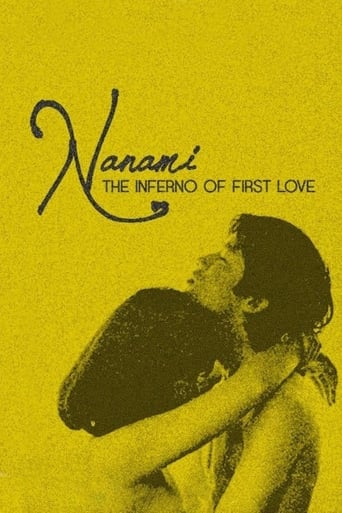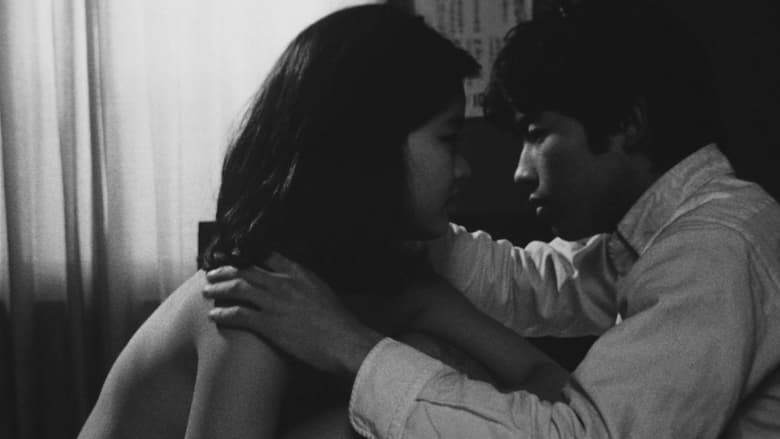

Nanami: The Inferno of First Love (1968)
A teenage goldsmith with a dark past tragically falls in love with a young nude model.
Watch Trailer
Cast


Reviews
Stylish but barely mediocre overall
Let's be realistic.
The movie is wonderful and true, an act of love in all its contradictions and complexity
Through painfully honest and emotional moments, the movie becomes irresistibly relatable
This is an actual question in the film, something to seriously meditate on. The riddle suggests the answer (that we get nothing), but the answer given challenges our preconceived notion.Can we say we get nothing from the peeling of the onion? We still have an onion (peeled away) and the peeling has happened, there is change, movement, progression. This is how I feel the film functions as New Wave. If we peel it to arrive at a core we may be frustrated, but if we come for the peeling instead? For the process of transformation itself? So, if you peel life what do you get? In a marvelous hypnosis scene, a young man is called by the doctor to visualize a screen and see what goes there. Do we project ourselves upon the images on screen or does the screen upon us?The first love here is awkward, erratic, youthful, perhaps not love at all. The inferno is society and the self, or the self trying to cope with society. I like how the portrait of youth is angsty but loving, how the folly of youth is embraced. In Yoshishige Yoshida's Eros + Massacre from the following year, the two young students living in a modern Japan are aimless, disaffected, they act as though they know. Here the young couple fumbles in the dark, only now getting to know that the world is a dark place.And if we peel cinema, what do we get then? If we begin to disassimilate the narrative in the effort to see what exists inside and examine the parts, do they make a whole or do we make it by our presence as viewers; this is why Inferno is valuable to me, because I'm always on the lookout for films the peel away the language of cinema, tweak and contort image to see will it break down at some point to reveal truth.Oh, we may get nothing at all eventually, or have a helluva hard time convincing others that nothingness itself is the most valuable, but we are still not at the point where we started. Meaning a journey has taken place that dislocated us, our sense, our sense of image. In this sense this is a true New Wave film. As with Godard the breach with traditional narrative is desirable here, unlike Godard though Nanami is not reactionary, it's angsty or unorthodox because it has a reason. Nanami's society hasn't solved its problems yet like the French New Wave's has, or perhaps in having solved some of them, a yawning chasm that goes back in time is revealed.
Well who says the Japanese can't do French? A long slow-paced drama about a man with a past. A past that screws up his potential romances. Apparently his father was a bad man and now he can only talk to loose chicks.The core is about first love in general. Most of us have dealt with it. This is how this one guy tries to.The filming is sehr arty and you know the dialogue was deliberate. The pace reminds one of a student film at times and the camera-work was good for the seemingly non-existent budget.I saw this on video years ago and saw it again in Tokyo during an art house revival. I wish it were better known.This is one you can take your lady to as well.
You may find this hard to see. It is a Japanese "new wave," film. It has a story of course, but such things are largely irrelevant. I'll give it because you may not see it. (In my comments, I assume most folks have seen the film.)A young man was abandoned as a child, and continuously molested by his adoptive father. He falls "in love" with a prostitute, around the same time he is imprisoned for molesting a four year old girl. We follow him and the prostitute (actually a "model") separately; that's most of the film, timewise. The story ends tragically.Its shot with hand-held cameras, and even by today's standards the camera movements are obviously there to remind you that there is a camera present. Not your eyes, but a physical camera.Following the French notion, the "new wave" ideas are followed: the fact that it is a film is explicit and films are referenced throughout the thing. And the elements of the story are abstracted usually from the most raw and common experience, love into something synthetic, which only can exists in cinema. These two elements were thought by the French create a new film narrative: not using the camera to place you in life, but the other way around, using life to allow you to travel to a new place, abstract, pure and effective within its own rules.That French experiment collapsed, I think, because as a class, French intellectuals don't have much horsepower, so after we get the cleverness of us being placed in this synthetic world, we look for a reason to be there other than tourism from boredom. The Japanese, on the other hand, actually live is an abstract world, deliberately so. And its of much the same type less now than 40-50 years ago (unless you count manga). By this I mean that the narrative they live in is close to the one they imagine, and they've had 1500 years of continuous stylization to abstract the narrative into a coherent collection of edges.So when I encounter Japanese new wave films, or better, those that quote and extend the concept, I know I'm where the idea wanted to be, but was couldn't go there with its originators.This one isn't powerful in the way the HongKongers Wong Kar Wai and Fruit Chan do, but it has oompf if you allow for the amazingly noticeable proscription on pubic hair but that's part of the game.Along the way, we have all sorts of side stories, as if they were movies within the movie. Some are flashbacks that are movies in the mind. Others are of the same type, but everyday events: a pocketknife is dropped; a foil gumwrapper blows in the wind.And these are interspersed with overt films within. We have a film about first love our lovers attend. She is a model for filmed stories, always pornographic (but indicated here as topless cheesecake because of the censorship) and often violent. He purchases a record designed to have a conversation with him. Much of the action touches on or is in a graveyard, shown as a collection of storymarkers for the dead.An item that permeates is a riddle. If you peel a cabbage, you get a core. If you peel an onion, what do you get? The film is intended to be a peeling of the onion. You'll need to watch the film (or email me) to get the answer to the riddle.Ted's Evaluation -- 3 of 3: Worth watching.
An insecure guy falls in love with a young nude model.But his past sexual abuse hinders him of loving inhibitedly. He meets a little girl in the park instead... The story isn't that linear and that's why the freely linked episodes of this film just takes you on a shaky underwater rollercoaster ride. Beautiful camera-shots, excellent editing, great music, great acting...


